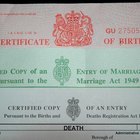
Jupiterimages/Polka Dot/Getty Images
Unless you wish to change the last name of a child you are adopting, you will need a court order to change either the first or last name of a minor child. Name changes are governed by state law, and these laws vary somewhat from state to state. Courts require an acceptable reason before they will grant a name change.
Research your state's name change law. If the district court's website does not include name change instructions, consult with the district court clerk or look up your state's name change statute on the Internet or in a law library.
Assemble proof of your state residence, if the name change law of your state requires such documentation. A state drivers' license or state ID is usually sufficient to establish residence. If the child lives with you, you probably will not have to assemble proof of residence for your child.
Obtain and complete a name change petition. Name change petitions should be available on the district court website or through the district court clerk. Some states require you to draft your own petition. These states describe in their name change statutes the information they require. Required information typically includes your name and address, the child's name and address, and the name and address of the child's other parent. You also have to state your reason for wanting to change your child's name.
File your name change petition -- along with proof of state residence if required -- with the clerk of the district court with jurisdiction over the county of your residence, and pay the filing fee. The court will notify you of the date of the name change hearing if one is required. A few states do not require hearings unless someone objects to the name change.
Publish notice of your intent to change the child's name, along with the place and time of the hearing, in the manner required by your state. Most states require you to publish a notice in the classified section of the local newspaper. Obtain a receipt from the newspaper.
Attend the name change hearing. Your child may or may not be required to attend. Bring a government-issued photo ID and your newspaper receipt. The judge may question you, and he may question anyone who attends the hearing in order to object to the name change. If your petition is granted, the court will order the name change and issue you a certified copy of the order.
Change the name on your child's birth certificate if state law permits, using the court order as evidence of the name change. Most states allow the amendment of birth certificates only for certain purposes -- if the biological father was incorrectly identified on the original birth certificate, for example.
Amend any other identity documents your child possesses, such as a Social Security card. Despite the name change, your child's Social Security number will remain the same.
Related Articles
What is the Six Month Rule for ...

How to Legally Change a Child's Last ...

How to Get Another Copy of a Name ...

How to Become an Emancipated Minor

Fastest Way to Legally Change Your Name

How to Get a Copy of a Dissolution of ...

How to Become Emancipated in the State ...

How to Get a Copy of Our Marriage ...

How to File for Legal Separation in ...

How to Apply for a Birth Certificate

How to Apply for a Long-Form Birth ...

How Does a Marriage License Work?

How to Change My Last Name for Free

How to Obtain Legal Guardianship of a ...

How to Place a Divorce Notice in a ...

How to File a Marriage License

How to Find Your Dad That You Have ...

How to Change the Father's Name on a ...

How to Find Out When Someone Died

What Documents Do I Need to Bring to ...
References
Resources
Writer Bio
David Carnes has been a full-time writer since 1998 and has published two full-length novels. He spends much of his time in various Asian countries and is fluent in Mandarin Chinese. He earned a Juris Doctorate from the University of Kentucky College of Law.
Photo Credits
Jupiterimages/Polka Dot/Getty Images